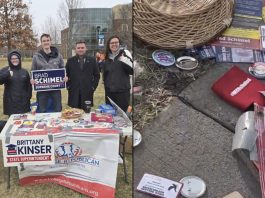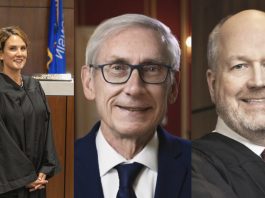In an extraordinary partisan-tinged rant to a legal publication, liberal Supreme Court Justice Jill Karofsky indicated that speaking to the press about a judicial complaint is a threat to Democracy, according to the Wisconsin Law Journal. The WLJ called the partisan broadside a “dire warning.”
Karofsky targeted Republicans in the rant, telling reporter Steve Schuster, “They (Republicans) are trying to weaponize the judiciary through threats, and trying to intimidate us on how to decide a case.”
This is the second time this year that Karofsky has gone on an unhinged partisan rant. “We are at a moment of time where our democracy literally is on the line, and we have to figure out if we are just going to turn it over to a bunch of insurrectionists who think it is perfectly OK to use violence and intimidation to get the rulings that they want in a courtroom,” she told The Washington Post in January.
“I think mostly radical people on the right … are trying to exert influence on the judiciary in an anti-democratic fashion,” she told the newspaper. “It is through intimidation. It is through threats. It is through violence.”
State Supreme Court justices are supposed to be non-partisan.
According to Schuster’s March 14 article, in her latest rant, Karofsky was referring to former state Courts Director Randy Koschnick exercising his right to file a complaint about the liberal justices’ selection of Judge Audrey Skwierawski to serve as his replacement. What really upset Karofsky and two other liberal justices was the fact that Koschnick shared that information with the news media.
Koschnick told Wisconsin Right Now on March 14: “Corrupt public officials who flagrantly and repeatedly violate our Constitution pose an existential threat to our justice system, our republic and our individual liberty. Their deeds absolutely need to be exposed to public scrutiny. For Justice Karofsky to actually state that constitutionally protected free speech against government corruption is a threat to democracy is all you need to know about her twisted, hyper-partisan agenda and her highly distorted view of the proper role of a judge.”
The liberal justices, including Karofsky, went on a dramatic partisan-tinged purge last August, ousting the respected Koschnick for no apparent reason. They replaced him with a sitting judge, Skwierawski, even though judges are not supposed to hold non-judicial offices midterm. They took a series of other partisan maneuvers, stripping the conservative chief justice of some of her authority.
“Liberals are saying Koschnick’s actions of speaking to the press is a threat to democracy as it violated their own privacy in what was intended to be a sealed complaint,” Schuster wrote in the story about Karofsky’s comments.
“This is putting their thumb on the scales of justice. This is a threat to our democracy,” Karofsky ranted to Schuster.
The Wisconsin Law Journal wrote, “As previously reported by the Wisconsin Law Journal, judicial complaints are confidential under Wisconsin law, but Karofsky herself released documents to The Associated Press just last month on Feb. 11.” Schuster noted, “The commission decided in November 2022 not to discipline her, but warned her to remain neutral and avoid making sarcastic remarks from the bench.”
Wisconsin Watch also reported on that hypocrisy by Karofsky, who “accused an attorney for former President Donald Trump of making racist contentions and trying to protect his ‘king.'” Her lawyer told the Judicial Commission that Karofsky “was trying to save the U.S. government.”
Schuster wrote: “Democrats claim pursuant to Wisconsin statutes complaints are secret to protect the privacy of both parties, however, Koschnick spoke to the news media about the complaint, in what Koschnick said is within his First Amendment rights.”
In a letter to the state Judicial Commission, which dismissed Koschnick’s complaint, three liberal justices (Rebecca Dallet, Karofsky, and Janet Protasiewicz) demanded the Commission take action against Koschnick, a respected former chief judge.
They accused Koschnick of violating confidentiality laws, writing, “The purpose of these confidentiality laws is to prevent the Commission from being used as an antidemocratic political weapon.”
Koschnick previously told the Associated Press that talking about his complaint was a First Amendment right and filing it a “civil and moral obligation.”
“There is no basis for discipline,” Koschnick told the AP. “I did nothing wrong.” He told the Wisconsin Law Journal he is a whistleblower.
“My complaint is not a proceeding, as discussed in the Wisconsin statute. I never discussed any proceedings with the media. I only released to the media what I had written on my own computer,” Koschnick said to the WLJ, which wrote, “Sec. 757.93(1)(a) provides that ‘proceedings’ of the judicial commission are confidential.”







![WATCH: Elon Musk Town Hall Rally in Green Bay [FULL Video]](https://www.wisconsinrightnow.com/wp-content/uploads/2022/04/Elon_Musk_3018710552-265x198.jpg)



![The Great American Company [Up Against the Wall]](https://www.wisconsinrightnow.com/wp-content/uploads/2025/03/MixCollage-29-Mar-2025-09-08-PM-4504-265x198.jpg)
![The Wisconsin DOJ’s ‘Unlawful’ Lawman [WRN Voices] josh kaul](https://www.wisconsinrightnow.com/wp-content/uploads/2025/03/MixCollage-29-Mar-2025-08-48-PM-2468-265x198.jpg)